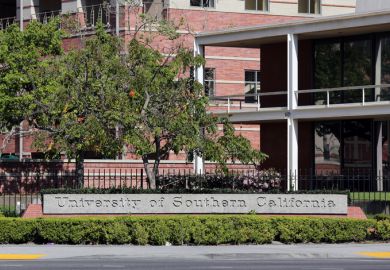A wealthy businessman has won the lone courtroom acquittal in the final trial arising from the 2019 US college admissions scandal, vindicating his strategy of blaming a wider culture of legalised bribery in higher education.
The defendant, Amin Khoury, was accused by federal prosecutors of paying $180,000 (£150,000) to a tennis coach at Georgetown University so that the coach would designate his daughter as a recruit for the team, ensuring her admission to the institution.
The jury in Boston, after a week of trial and a day-and-a-half of deliberations, agreed that Mr Khoury was not guilty of bribery, fraud or conspiracy charges.
It was the only jury win among the 57 people – mostly parents – charged in the overall process.
Mr Khoury’s defence team argued that the scion of a family made wealthy in the aircraft construction industry did pay money to the Georgetown tennis coach, Gordon Ernst, but regarded it as part of the normalised system of rich Americans cultivating societal access.
Previous defendants in the series of three-year series of prosecutions tried similar arguments, but without luck. Only three others tried fighting the government at trial – two parents and one coach – and all lost. The overwhelming majority of people charged in the scandal chose to plead guilty and received sentences ranging from probation to nine months in prison.
The cases mainly centre on William Singer, a Los Angeles-area academic consultant who cultivated ties with sport coaches and other people in key positions at elite universities. His usual strategy involved exploiting the tradition of coaches being able to designate for admission anyone they were willing to put forth to their university as a legitimate competitive athlete.
From the start, federal prosecutors acknowledged the complicated boundary of their pursuit, given that many top US universities openly allow admissions preferences to families that make large financial donations. Federal prosecutors insisted, however, that making those payments to coaches without the knowledge of the institution constituted fraud.
Prosecutors also accused many of the participating parents of falsely classifying their payments to coaches as tax-exempt donations – without explaining why the same investigative energy has not been applied to other types of donations in higher education that are known to benefit the contributor.
The top federal prosecutor in Massachusetts, US attorney Rachael Rollins, instead claimed overall victory in the overall campaign, declaring in a post-trial assessment: “These cases, writ large, have exposed the disturbing, improper, and inequitable role that wealth and privilege can play in distorting a system that is supposed to be merit-based.”
Attorneys for Mr Khoury offered a similar perspective, acknowledging the clear reality of financial power in gaining admission to top US universities. A key difference from the prosecution viewpoint, the lawyers argued, was that Georgetown University embraced that system, welcoming families such as the Khourys for their money.
Georgetown, the lawyers argued, “routinely treated the kids of parents with deep pockets favourably in admissions”.
Mr Singer cooperated with prosecutors after being told that his activities had been discovered, helping to amass evidence against the parents he had been serving. His sentencing is scheduled for September.
Register to continue
Why register?
- Registration is free and only takes a moment
- Once registered, you can read 3 articles a month
- Sign up for our newsletter
Subscribe
Or subscribe for unlimited access to:
- Unlimited access to news, views, insights & reviews
- Digital editions
- Digital access to THE’s university and college rankings analysis
Already registered or a current subscriber?








